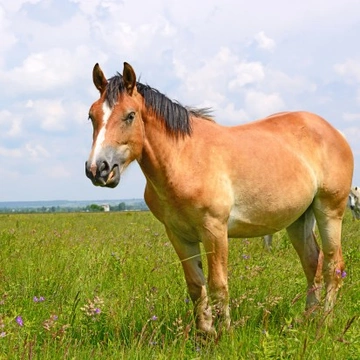
Symptoms & Treatment of Ringworm in Horses
It's really important to spot the signs of ringworm in horses early otherwise it could spread to other animals in a field or on a yard. However, you need to know what symptoms and signs to look out for before you do anything. However, if you think there's a problem, you should isolate your horse and start an effective treatment as soon as the condition is diagnosed.
Below are a few tips on how to recognise the symptoms and how to treat ringworm in horses when it rears its ugly head.
You have to bear in mind that when left untreated, ringworm can develop into a serious health problem for horses. Starting an effective treatment as soon as you think there is something wrong will prevent the condition from firstly, getting any worse and secondly from spreading to any other horses that yours may come into contact with whether out in the paddock or on a stable yard.
Symptoms & Signs to Watch Out For
Left untreated, the infection will result in your horse losing their coat where the infection has taken hold, and you may even notice a change in their behaviour because the irritation ringworm causes, can drive a horse quite mad. The fungus responsible for ringworm in horses and other animals as well as humans, is highly contagious and will spread like wildfire if left unchecked.
The first sign there may be something wrong with your horse is their coats will appear a lot “coarser” than usual and it may also look rather unkempt and lack lustre. With this said, another condition that affects horse's coats in much the same way is rain scald, so it's important to diagnose it is ringworm and nothing else that's causing the problem.
Another symptom and sign your horse may be suffering from the condition, is their coats will be incredibly itchy which is a sure sign they are suffering from a bout of ringworm. Your horse will rub away until the area affected becomes red raw. You may also find your horse is totally fixed on their “itchiness”, unable to concentrate on anything else which makes them impossible to ride or school.
You'd need to contact your vet and ask them to take a sample of skin in order to have it analysed to confirm it is ringworm but in the meantime, to be on the safe side, you should isolate your horse from any others that may be around whether in a field or stable yard because if it is ringworm, it's very contagious.
If it's just a mild case of ringworm, it is quite easy to treat with specifically formulated anti-fungal shampoos and creams with the condition usually clearing up pretty quickly once the treatment is started. However, if the infection is more serious and persistent, then it may well take a lot longer to clear up using the same treatments. You would need to keep your horse isolated the whole time until the problem is under control.
Advice on How to Treat Ringworm
After a correct diagnosis of the condition has been made, you would need to carefully clip the hair around the infected areas. Common places where ringworm can take hold are around the girth area which is where it often begins.
After clipping, gently clean up all the dead skin and hair on the infected areas
Sponge a little water on the clipped areas and then use a specifically formulated ringworm treatment for horses like Betadine, which is an effective anti-fungal wash that can be purchased from either your vet or good horse supply shops. You need to leave the lotion on for at least 10 minutes before washing it off
To completely wash off the treatment, mix 2 tablespoons of white vinegar with some water and use this mixture to rinse off the Betadine
It's a good idea to towel dry the area or even use a hair dryer, so that no moist patches are left where the fungus can continue to thrive and breed making the condition harder to get under control
Dress the affected areas with an anti-fungal dressing which you should be able to can get from your vet. This will protect the exposed skin
You would need to apply Betadine ointment every day for at least a week or until the infection is under control
It is really important to disinfect your horse's stable making sure the disinfectant is also used on any exposed wood. The fungus that causes ringworm can remain dormant in wood for years so it's important to prevent this from happening. You may want to treat the wood with a specifically formulated wood preserver which is another way of killing off the fungus that causes ringworm in horses.
When treating a horse with ringworm, you should also wash any clothes you wear and throw any gloves away to make sure the fungus cannot be inadvertently transmitted to other horses you may come into contact with.
Conclusion
Ringworm in horses is a nasty condition that can lead to all sorts of other problems if left untreated. Not only will the condition drive your horse mad through the irritation, but you also run the risk of other horses catching it if they come into contact with yours, which no-one will thank you for. You must isolate your horse as soon as you think they may have a bout of ringworm, and keep them away from other horses until a correct diagnosis has been made. After this, it is really important to start treating the ringworm so you get it under control by using the methods, shampoos and creams mentioned above.



